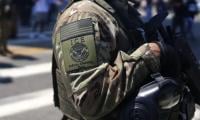Sindh wants Uzair’s JIT report to remain confidential
The home department told the Sindh High Court (SHC) on Tuesday that making the joint investigation team’s (JIT) reports on Lyari-based gangster Uzair Baloch and other offenders could jeopardise the state’s efforts to ensure prosecution and conviction of criminals.
The home secretary submitted the comments on behalf of his department on Pakistan Tehreek-e-Insaf (PTI) leader Syed Ali Haider Zaidi’s petition seeking disclosure of JIT reports on Baloch, former Fishermen Cooperative Society chairman Dr Nisar Morai and the Baldia Town garment factory arson.
The secretary said that only charge sheets were supposed to be public documents, adding that the JIT’s records might sometimes not be substantiated by other valid investigative measures, reports or statements.
Therefore, he stressed, making the JIT’s reports public might jeopardise the court proceedings and adversely affect the state’s efforts to get offenders prosecuted and convicted through the criminal justice process.
He said the Baldia factory arson case was pending in the trial court, to which the relevant charge sheet was submitted, adding that any information other than that did not carry the status of prosecution.
He requested the SHC to dismiss the petition as “baseless” and “against the norms of justice”, following which the court’s division bench headed by Justice Naimatullah Phulpoto took his report on record and adjourned the hearing until December 21 pending the petitioner’s arguments.
Zaidi’s petition claimed that the JIT reports had made startling disclosures about the involvement of politicians in crimes such as murder and extortion. He said the relevant authorities were approached to obtain copies of the reports and to make them public but to no avail.
The PTI leader said Baloch, tried by a military court under charges of espionage for Iranian intelligence agencies, had confessed to his affiliation with the Pakistan Peoples Party’s (PPP) central leadership, including its women wing leader Faryal Talpur.
He said the gangster had admitted to paying Faryal the extortion money collected from different departments, adding that the man had also confessed to killing several people on the PPP leadership’s directives and to facilitating them in owning private properties after threatening their owners to vacate them.
Invoking the constitution’s Article 19-A (“Right to information”), Zaidi asserted that the provincial and federal governments’ failure to publish the JIT reports was a violation of the citizens’ fundamental rights.
He said the content of the JIT reports was of public importance because it related to crimes that had wide-reaching implications on the people at large. To strengthen his party’s case, he said print and electronic media, through various sources, had reported on the JITs obtaining evidence that suggested the involvement of various politicians in criminal activities. “It is imperative that such people are held accountable for their actions.”
He argued that as long as the JIT reports were kept confidential, the public would be left at the mercy of corrupt politicians who continued to silently exercise the influence they had over them, whereas investigations launched against them would go nowhere.
The PTI leader said disclosure of the JIT reports was quite important because they carried allegations that the state machinery was being used to commit and cover up crimes. “People have the right to know if public resources were used for such activities.”
He said that the very purpose of constituting the JITs was to uncover the truth of the crimes they were to investigate, adding that the reason stood defeated if the reports were kept confidential.
He maintained that the JIT reports were required to be made public under the provisions of the Sindh Transparency & Right to Information Act. He said the families of the Lyari gang war’s victims and of those who perished in the Baldia fire and other crimes deserved justice. Their heirs should know who the perpetrators of those crimes were, he added, and requested the court to publish and provide official copies of the reports prepared by the JITs in the cases.
-
 Piers Morgan Reacts To Photo With Ghislaine Maxwell
Piers Morgan Reacts To Photo With Ghislaine Maxwell -
 UK Data Privacy Regulators Raises Safety Concerns, Warn Against AI-generated Images
UK Data Privacy Regulators Raises Safety Concerns, Warn Against AI-generated Images -
 Kate Middleton, Prince William 'steeling Themselves' For Harry's Inevitable Arrival With Lilibet, Archie
Kate Middleton, Prince William 'steeling Themselves' For Harry's Inevitable Arrival With Lilibet, Archie -
 Australian PM Agrees With King Charles, Backs Removing Andrew From Line Of Succession
Australian PM Agrees With King Charles, Backs Removing Andrew From Line Of Succession -
 Kiefer Sutherland's Arrest Sparks Fresh Fears As Friends 'beg Him' To Get Help After Father's Death
Kiefer Sutherland's Arrest Sparks Fresh Fears As Friends 'beg Him' To Get Help After Father's Death -
 John Davidson 2026 BAFTA Backlash: Tourettes Action Charity Defends Him Over 'unintentional' Racial Slur
John Davidson 2026 BAFTA Backlash: Tourettes Action Charity Defends Him Over 'unintentional' Racial Slur -
 Kim Kardashian Obsessed TV Star 'Lip King' Breathes His Last At 32
Kim Kardashian Obsessed TV Star 'Lip King' Breathes His Last At 32 -
 Prince Harry Backtracks On Privacy Fears For Princess Lilibet: Here’s Why Public Saw Her Face Amid Andrew Drama
Prince Harry Backtracks On Privacy Fears For Princess Lilibet: Here’s Why Public Saw Her Face Amid Andrew Drama -
 Prince Harry Appears To Have Bowed To Meghan Markle's Decisions
Prince Harry Appears To Have Bowed To Meghan Markle's Decisions -
 Andrew Scandal Shockwave Prompts Key Commonwealth Member To Back UK Efforts
Andrew Scandal Shockwave Prompts Key Commonwealth Member To Back UK Efforts -
 Sterling K. Brown's Wife Reveals If She Gets 'Paradise' Spoilers
Sterling K. Brown's Wife Reveals If She Gets 'Paradise' Spoilers -
 Rape Suspect Flees Aboard After Mistaken Prison Release
Rape Suspect Flees Aboard After Mistaken Prison Release -
 Jack Hughes' Patriotic Words Spark Calls For Tate McRae To Dump Her Boyfriend
Jack Hughes' Patriotic Words Spark Calls For Tate McRae To Dump Her Boyfriend -
 Andrew Pushes For Major Deal With King Charles To Avoid Jail
Andrew Pushes For Major Deal With King Charles To Avoid Jail -
 50 Cent Online Trolling Tactic Exposed As He Targets Rival Rappers' Mothers In Rap Beefs
50 Cent Online Trolling Tactic Exposed As He Targets Rival Rappers' Mothers In Rap Beefs -
 King Charles Attends 'series Of Meetings' Amid Growing Calls For His Abdication
King Charles Attends 'series Of Meetings' Amid Growing Calls For His Abdication



